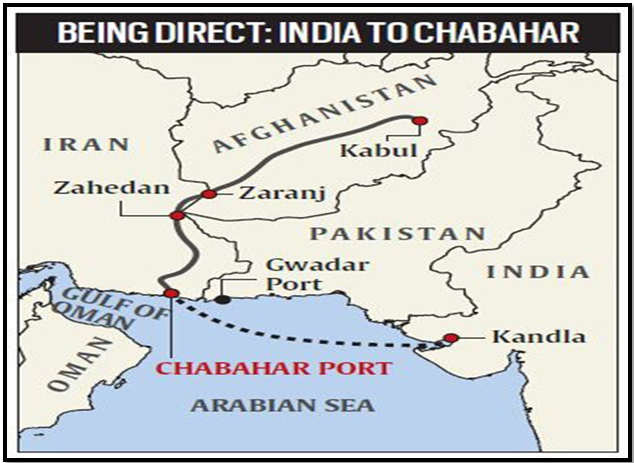CHABAHAR PORT: INDIA’S STRATEGIC TRADE GATEWAY
Syllabus:
GS 2:
India and its neighbourhood relations.
Effect of Policies and Politics of Developed and Developing Countries on India’s interests, Indian Diaspora.
Why in the News?
India recently secured a 10-year contract to invest in and operate the Shahid-Behesti terminal at Chabahar Port in Iran. This significant agreement comes amid regional instability, highlighting the port’s strategic importance for India’s connectivity with Central Asia and its efforts to bypass Pakistan.
Source: Dics
India’s Strategic Investment in Chabahar
- Extended Contract: India has secured rights to invest in and operate the Shahid-Behesti terminal at Chabahar Port for another 10 years, underscoring its commitment to this strategic project.
- Economic Anchor: The port is a cornerstone of economic relations between India and Iran, vital for enhancing bilateral trade and connectivity.
- Geopolitical Timing: The deal was finalized amidst significant regional instability, including the ongoing Gaza conflict, heightened Israel-Iran tensions, and internal political challenges in Iran following the death of its President and Foreign Minister.
- Strategic Location: Chabahar’s location is pivotal for India’s strategy to bypass Pakistan and enhance connectivity with Central Asia and Russia through the International North-South Transport Corridor.
- Afghanistan’s Involvement: The Taliban-led government in Afghanistan supports Chabahar, indicating its regional significance and potential to reduce reliance on Pakistani ports.
| Significance of Chabahar Port for India
About Chabahar Port
Significance of Chabahar Port
|
Challenges in India-Iran Relations
- Economic Dependencies: While Chabahar is a key project, India-Iran relations are hindered by the lack of expansion in other areas of economic cooperation.
- Historical Projects: Many past joint ventures, such as the Farzad-B gas field and the IranoHind shipping company, have been discontinued due to sanctions and changing geopolitical interests.
- Sanctions Impact: U.S. sanctions have significantly affected India-Iran economic projects, limiting the scope of bilateral cooperation.
- Legacy Project: Chabahar, initiated in 2003, remains one of the few enduring symbols of India’s economic engagement abroad, alongside other projects like Sakhalin-I in Russia.
- Geopolitical Tensions: The project exists within a complex geopolitical landscape, requiring careful navigation of regional conflicts and international relations.
Diplomatic Nuances and Strategic Leverages
- Israel-Iran Conflict: The recent deal was signed amidst escalating tensions between Israel and Iran, demonstrating India’s diplomatic agility.
- Adani’s Investment in Haifa: India’s significant investment in Israel’s Haifa port highlights its balanced diplomatic relations with both Israel and Iran.
- U.S. Diplomacy: The U.S. recognizes India’s unique position and the potential benefits of its engagements, despite occasional tensions over sanctions.
- Regional Alliances: India’s participation in new diplomatic and economic initiatives like I2U2 and the India-Middle East-Europe Economic Corridor showcases its multifaceted regional strategy.
- Strategic Importance: Continued development of Chabahar is seen as vital for India’s access to Central Asia and Afghanistan, offering alternatives to China-backed projects.
U.S. Sanctions and Strategic Autonomy
- Myopic Sanctions: U.S. threats of sanctions against Chabahar are seen as shortsighted, ignoring the port’s strategic importance for regional stability and connectivity.
- China-Iran Relations: While China has significant investments in Iran, Tehran’s geopolitical strategy remains diverse, not exclusively aligned with Beijing.
- Iran’s Strategic Flexibility: Iran’s geopolitical maneuvers are characterized by a survivalist approach, utilizing a broad range of diplomatic strategies.
- Historical Context: India’s past experiences, such as the negative impact of halting Iranian oil imports under U.S. pressure, highlight the need for a more nuanced approach.
- Policy Recommendations: The Biden administration should reconsider past doctrines and recognize the strategic value of India’s engagement with Iran, particularly through Chabahar.
The Bigger Picture for India and Chabahar
- Beyond Chabahar: India must diversify its bilateral engagements with Iran beyond the Chabahar project to ensure a stable and multifaceted relationship.
- Sanctions Accommodation: The U.S. should adopt a more flexible stance on sanctions against Chabahar, recognizing its broader strategic significance.
- Regional Integration: Chabahar’s development can facilitate greater regional integration, benefiting not only India but also aligning with larger American geopolitical aims.
- Alternative Routes: The port provides crucial access routes to Central Asia and Afghanistan, offering alternatives to Chinese-backed infrastructure projects.
- Diplomatic Channels: The U.S. maintains its own diplomatic channels with Iran, which can be complemented by India’s engagements, promoting a more balanced and comprehensive regional strategy.
Way Forward: Strategic Actions for India
- Diversify Engagement: India should expand its economic and strategic cooperation with Iran beyond Chabahar to include sectors like energy, agriculture, and technology.
- Strengthen Diplomatic Channels: Enhance diplomatic efforts with the U.S. to secure exemptions or flexibility on sanctions related to Chabahar, emphasizing the port’s strategic importance.
- Leverage Regional Alliances: Utilize platforms like I2U2 and the India-Middle East-Europe Economic Corridor to build broader regional support and integration, reducing dependency on any single partner.
- Engage with Afghanistan: Continue to support Afghanistan’s involvement in Chabahar, ensuring the port remains a viable alternative to Pakistani and Chinese-controlled ports.
- Enhance Infrastructure: Invest in the development of Chabahar’s infrastructure to improve its operational efficiency and connectivity with other regional transport networks.
- Revive Historical Projects: Reassess and potentially revive past joint ventures with Iran, such as the Farzad-B gas field, to strengthen economic ties and diversify energy sources.
- Promote Private Sector Involvement: Encourage Indian private sector investments in Iran to foster economic cooperation and mitigate the risks associated with government-led projects.
- Adapt to Geopolitical Shifts: Stay agile and adapt to geopolitical changes, ensuring that India’s policies reflect the dynamic regional and global landscape while maintaining strategic autonomy.
Conclusion
The Chabahar project represents both significant opportunities and challenges for India and its bilateral relations with Iran. The successful development of Chabahar can significantly enhance India’s access to Central Asia and Afghanistan, providing crucial alternatives to China-backed projects and aligning with broader American strategic interests.
Source:The Hindu
Mains Practice Question:
Discuss the strategic significance of the Chabahar Port for India, highlighting its potential impact on regional connectivity and Indo-Iranian relations. What challenges does India face in leveraging this port, and how can these be addressed?
Associated Article:
https://universalinstitutions.com/chabahar-port-a-strategic-hub/




